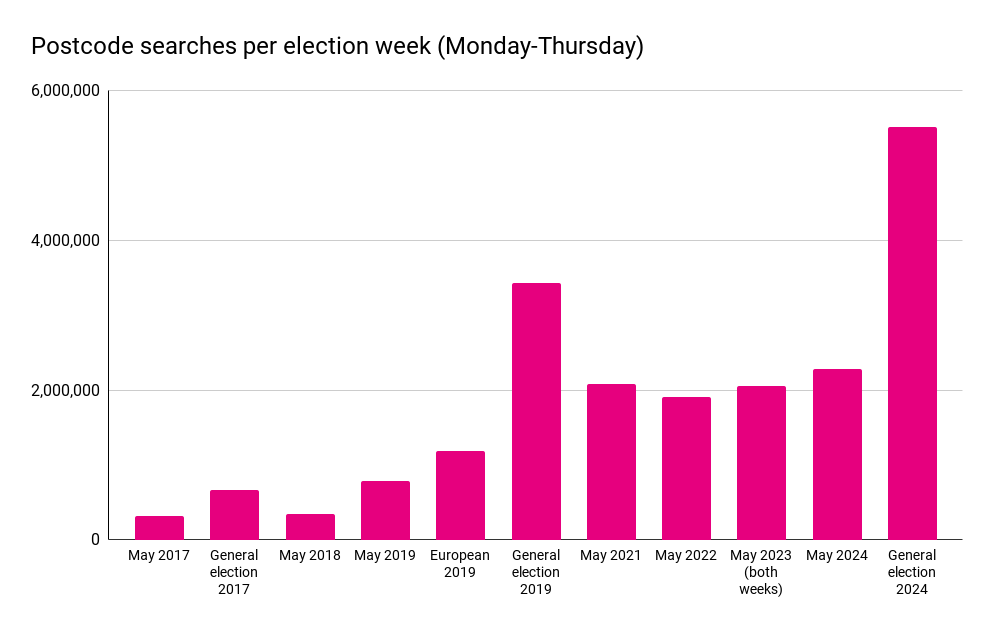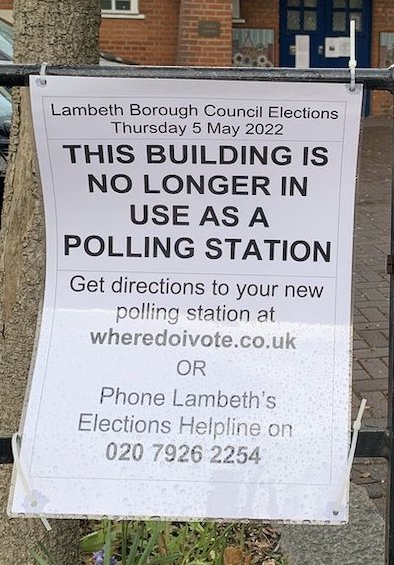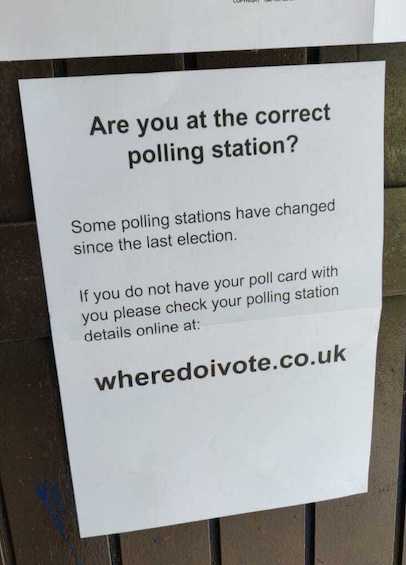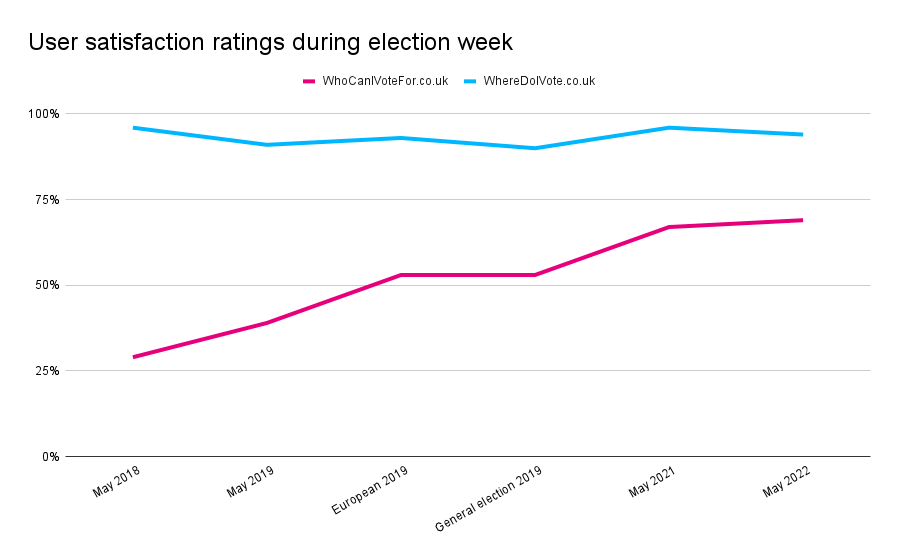Local and Devolved Elections, 5 May 2022

Summary Highlights
- 1.9 million postcode searches during election week
- 83% of users were more likely to vote after using the polling station finder
- 100% of councils (227 total) provided us with polling place data
- 21,300 candidates added to the database
- 1,526 volunteers made 64,000 edits over the election period
Election overview
On 5 May 2022, elections were held to the Northern Ireland Assembly, all councils in Scotland and Wales, and 146 councils across England, including all London Boroughs. There was also a governance referendum in Bristol. This was the first time Northern Ireland had been to the polls since the 2019 General Election. It was also the first election since May 2019 in which some areas of England had nothing to vote for.
The standout success for Democracy Club this election was our polling station work: for the first time, every council taking part provided us with data, allowing us to serve information to every part of the UK. This included a partnership with the Electoral Office for Northern Ireland, once again for the first time.
We strengthened our partnership with the Electoral Commission, launching and running their API and interactive widget, using our data. The Electoral Commission’s API is now used by GOV.UK to run its “Contact your local Electoral Registration Office” service. We also received funding and resources from the Welsh Government to improve our polling station finder and candidate look-up services, including translating WhoCanIVoteFor.co.uk into Welsh.
Our volunteer community — which powers our data collection — came out in force to help, collecting all the data we need within days of it being published. We also received a significant uptick in interest for our data from organisations and journalists, with stories in over a dozen outlets, including The Times, The Scotsman, Wales Online and MyLondon.
Most importantly, our user satisfaction rates remain high and growing. This year we also introduced a new evaluation question — ‘“Has this information made you more likely to vote?” — which was answered in the affirmative by 83% of WhereDoIVote.co.uk users, and 52% of WhoCanIVoteFor.co.uk users.
Data collection
Polling Stations
This year we reached a major organisational milestone, collecting polling station data for all areas holding elections for the first time (227 councils - 18,000 polling places in total). Furthermore, we achieved this with a week still to go before polling day, giving us more time to focus on candidate data and communications.
This success was made possible through our continued strong partnership with the Electoral Commission, who also helped us to secure data from the Electoral Office for Northern Ireland. At the same time we saw increased engagement from councils themselves, with more and more including the finder in their own communications campaigns.
This year we trialled a new self-serve uploader tool for use by councils. This allows electoral administrators to upload data to us directly, and to check their polling places once we have imported them into the finder. This was used by 161 councils (71%) to upload or check their data, a far higher take-up than we anticipated. Feedback was very positive, and we will continue to test, use and improve this tool over the next year, in preparation for the 2023 elections.
As a consequence of the above factors, this year’s polling station data collection provided a noticeably smaller communications burden than in previous years.
Candidates
As usual, Democracy Club collected nomination details of all candidates standing for election to principal councils (21,000 candidates, standing for 6,819 council seats), as well as English Mayors and the Northern Ireland Assembly. We were also pleased to experience increased interest in our candidate work among electoral administrators, and hope to explore how we can work more closely with them in this area during future elections.
In the case of the Northern Ireland Assembly, we compiled personal details — at minimum, a photo and political party information — for all except one candidate (99.5%), our best coverage of a devolved election and something which explains WhoCanIVoteFor.co.uk's very high satisfaction rate (91%) among Northern Ireland users.
We collected candidate data for England and Wales (published on 6 April) within four days of close of nominations, and Northern Ireland (8 April) within hours. However, our Scottish data collection (30 March) took a full week to complete, despite there being a much smaller number of candidates involved than either England or Wales. This was due to a combination of difficult Scottish nomination papers (which our bots couldn’t parse, or parsed incorrectly — creating more work for volunteers), and a lack of volunteer engagement.Democracy Club has fewer active Scottish volunteers, especially as compared with Wales.
In addition to candidates, we also set up Google sheets to collect political party and hustings information. While we had some volunteer help with these and more interest overall than in 2021, there is still room to develop these tasks further.
Election Results
Our election results collection in England and Wales proceeded in record time, and we held a full database of votes cast in the two nations within four days of polls closing. However, our media impact and reach was limited by the way in which we publish results (in CSV format lacking many of the fields included in our candidate data and which excludes, among other things, uncontested elections). We hope to make improvements to this in time for the 2023 elections, and in turn to potentially release this data as an API.
Volunteers and the Club
Democracy Club continued to maintain a high level of volunteer engagement during the election period. In March and April 2022, 1,526 users made 64,000 edits to our candidate database. 1,329 new user accounts were created over the same period, bringing the total number of accounts to 12,200. Our Slack channel now contains over 900 members.
In future we hope to survey our volunteers to better understand their demographics and motivations. This will create the foundation for us to be more strategic in our approach to volunteers.
Evaluating overall reach and impact
Usage statistics
During the week of the election, our database processed 1.9 million postcode searches from the UK public, of which 1,513,493 were received from areas holding an election.
| Nation | Number of searches |
|---|---|
| England | 1,514,256 |
| Scotland | 210,954 |
| Wales | 126,647 |
| Northern Ireland | 51,232 |
These figures represent our third-highest number of postcode searches for a scheduled election, including good increases for Scotland and Wales.
Of these searches, 890,331 (47%) were processed through our API. This includes 537,156 via the Electoral Commission website, 52,740 via the Commission’s new API (used by GOV.UK), and 2,705 via the Commission’s widget. Other API users included InYourArea (200,211), The Times (2,403) and others.
This election saw over 120 organisational users of our widgets, of which 78 were councils (inc. 5 in Scotland and 9 in Wales). In total, our widgets processed 60,000 postcode searches during election week. Non-council users included votingcounts.org.uk, electionmaps.uk, sluggerotoole.com, mumsnet.com, and the central party websites of the Liberal Democrats and Plaid Cymru.
How does this compare to our historic postcode searches?

Excitingly, we spotted two examples of WhereDoIVote.co.uk featured on physical signage in or near polling stations. Additionally, one council advertised the site in their print newsletter, and we also found an example of it featuring on a political party leaflet put out on polling day.


Website Traffic
Google Analytics reports 792,159 unique visitors to WhoCanIVoteFor.co.uk between 30 March (Scottish SoPN day) and 5 May. 479,175 of these arrived between 2-5 May, of which 15% were referrals. WhereDoIVote.co.uk had 233,178 visitors between 2-5 May 2022, of which 21% were referrals. Prominent referral sources included Londonist.com, GBnews, NationalWorld.com, and a wide array of other local and national news websites. We are especially pleased to note that the polling station finder was used widely by political parties: in addition to the widget users noted above, the finder was shared on social media by the Alliance Party of Northern Ireland and four of the five Holyrood parties in Scotland.
Traffic to WhoCanIVoteFor.co.uk illustrates why postcode searches should not be regarded as the whole picture when measuring reach and impact. For example, while we had 51,000 Northern Irish postcode searches during election week, Google Analytics reports over 80,000 unique visitors to Northern Ireland Assembly ballot URLs on WhoCanIVoteFor.co.uk. Because these URLs cannot be reached via a postcode search, this provides a rough indication of the number of people who arrived on our site via an organic search or referral, meaning that, for Northern Ireland at least, the number of people reached by our services was potentially more than double that indicated by the number of postcode searches.
User feedback

Each year we ask visitors to our sites the question ‘Did you find what you were looking for?’. This year, 69% of WhoCanIVoteFor.co.uk's election week visitors answered ‘yes’, a rise of two percent as compared with 2021 and the fifth consecutive election where this figure has gone up. Satisfaction on WhereDoIVote.co.uk, which is always very high, was 94%.
For the first time this year we asked users a second yes/no question: ‘Has this information made you more likely to vote?’. 52% of WhoCanIVoteFor.co.uk and 83% of WhereDoIVote.co.uk users answered ‘yes’. This is a brilliant result, vindicating our belief that improving ease of access to basic election information can make a significant difference to democratic engagement. As our analysis of the user feedback demonstrates, a large proportion of negative answers were either the result of the user already being 100% likely to vote, or a general dissatisfaction with their ballot options or UK democracy unrelated to our services..
Press and PR
As noted in the 2021 report, Democracy Club has struggled in the past with a low media profile and awareness of our work among journalists. This year saw this situation improve. In particular, a number of journalists downloaded and used our candidate CSV as the basis for stories, a significant contrast with past elections when few if any used our CSV downloads. We also benefited from greater attention on the local elections (last year journalists were focused on higher-level elections, such as the devolved parliaments).
Despite not working with the Fawcett Society on a joint release this year (due to other communications commitments on the part of Fawcett), our gender analysis secured stories in The Times and The Scotsman. We also received some coverage of our polling station data, which was a target following on from last year’s partnership with the AEA.
Examples of our data in the press:
- Local elections 2022: how many candidates by party, youngest and oldest, gender split and most common names (National World, 21 April)
- Council elections Scotland: Only 33% of candidates running for May local elections are female (The Scotsman, 28 April)
- Split vote threat to left in Thursday’s elections as ‘progressives’ outnumber conservatives by two to one (The Independent, 2 May)
- Local election analysis says the typical candidate is a 47-year-old man called David (The Times, 3 May)
- Alleged Labour and Lib Dem ‘pact’ could send Tories plunging to local elections defeat (Daily Telegraph, 3 May)
- Scottish Council Elections 2022: Who’s standing, past demographics and candidates’ favourite biscuits (4 May, The Courier)
- 'One party state': A third of candidates have ALREADY won in this London council because no one is standing against them (MyLondon, 5 May)
- Local elections 2022: The UK's most unusual polling stations (Reach/Wales Online, 5 May)
There is still much to achieve in this area. Our website needs more clear signposting for journalists and researchers, and our data downloads (especially results) require more contextualization and clarity. Correcting these issues will form part of our work in the second half of 2022. Having completed the polling station data collection earlier than planned, we had some time to experiment with the research potential of our candidate database, and hope to expand this area of our work going forward. Our social media output was stronger this year, with our results work in particular attracting attention.
Outputs
Work for the Welsh Government
In January Democracy Club was commissioned by the Welsh Government to undertake a range of work to better adapt our services for the 2022 local elections. This consisted of three major changes: the previous party membership on nomination forms, advanced voting, and translation of WhoCanIVoteFor.co.uk.
Previous party affiliation
Following the Local Elections (Principal Areas) (Wales) Rules 2021, candidates must now declare whether they have been a member of one or more registered political parties during the 12 months prior to the publication of the notice of election. If that party membership is different from the one they are standing under, this information must be published on the SoPN. Not only were we able to collect and publish this information within our data and on WhoCanIVoteFor.co.uk, but the information also greatly improved our ability to identify and link together past candidacies within our archives.
| Description (if any) | Statement of Previous Political Party Membership (details and dates of membership to any other registered political party at any time during the previous 12 months) |
|---|---|
| Welsh Labour / Llafur Cymru | |
| Independent / Annubynnol | Labour Party: 18/03/2021 — 18/03/2022 |
Advanced voting
5 May saw four ‘advanced voting’ trials. Voters in four council areas — Blaenau Gwent, Bridgend, Caerphilly and Torfaen — were able to cast a ballot in the days before the poll.
In the weeks before the election, Democracy Club liaised with each of the advanced voting councils to confirm the details about their trials and offer support. We made significant changes to our polling station finder, so that any relevant postcode would display information about the advanced voting trial, including a map of the venue and opening times. This information was also translated into Welsh for the finder. We are pleased to note that all four councils promoted the service to their voters in the run-up to the election. We displayed advance voting information from 22 April onwards. Over this period we provided approximately 2,100 users with advance voting information.
Advance voting was the most complex change we have implemented on the polling station finder for a number of years, and we’re very satisfied with how smoothly it went. With the infrastructure now in place, we will be able to implement it more easily in the future, if advance voting is rolled out more widely
However, were advance voting to become the norm across Wales or the rest of the UK, it would be necessary to develop a more robust method by which councils could provide the relevant information to Democracy Club. This would become particularly necessary if advance voting methods differed across the country in the way they did in 2022.
Translation
Democracy Club’s widgets have offered Welsh text since 2019, and WhereDoIVote.co.uk has been available in the language since 2021. However, WhoCanIVoteFor.co.uk remained English-only. Aside from the obvious accessibility issues for Welsh speakers, this also limited the extent to which the Welsh local government could use and share the resource, as by law their communications must be bilingual.
Translating this site proved a large and complex task, as it contains a large amount of text and is designed to cover a multitude of scenarios (different electoral systems, uncontested elections, etc). Working in partnership with a team of translators, we were able to translate the website within the short timeframe before the election, with the last updates deployed by the end of April.
Not only does this increase the site’s reach within Wales, but the translation infrastructure added to the site will make it easier for us to add additional languages in the future.
Electoral Commission
Our partnership with the Electoral Commission deepened further this election. As a way of encouraging more organisations, especially within government, to use the election data we collect, we undertook to build and maintain a ‘branded’ Electoral Commission API and widget. We built this in partnership with the Electoral Commission and launched them in April. These new offerings met with immediate success: the API is now used by GOV.UK to power a ‘Contact your local Electoral Registration Office’ lookup, and the widget was used by councils and media organisations.
Other outputs
In the year since the May 2021 elections we made a range of other changes and improvements to our infrastructure and websites. We added governance referendums to our elections model, and created a new ID for City of London Aldermanic elections. We significantly improved our handling of uncontested and countermanded elections by introducing logic to account for different scenarios — this was especially important this year because Wales traditionally has a large number of uncontested seats. We also made a range of important improvements to WhoCanIVoteFor.co.uk's deployment model and our SoPN parsing automation, both of which paid considerable dividends during the election by speeding up crowdsourcing and bug fixes.
Shortly before the election we also added capability for our API to publish details of hustings and election leaflets, hitherto only published on WhoCanIVoteFor.co.uk. It is hoped that this will form the first part of future work focused on improving and expanding our handling of these types of information.
Next steps for future elections
We have identified a few areas where we would like to focus our attention ahead of future elections. We would like to:
- Continue to work alongside and support the Electoral Commission in its digital work.
- Develop new partnerships which inspire greater civic participation.
- Make clear our APIs are available for use more prominently on the Democracy Club website and create different packages, tiers of usage, and different features.
- Continue to improve the automation that powers our work so that we can do more, more efficiently.
- Do a survey of our volunteers and generate a plan for recruiting more diverse volunteers, with a focus on volunteers in Scotland in particular.
- Improve our hustings, political parties and election leaflet offerings. We now collect and hold a large quantity of ‘extra’ election information. We want to move away from our reliance on Google Sheets data collection and integrate these into our wider crowdsourcing environment.
- Continue conversations with EMS providers to improve the publication of polling station data to us.
Recommendations to improve democracy
There are fundamental improvements that can be made which could dramatically improve the quality of our democratic systems.
- We strongly recommend that nomination papers are published on a timely, discoverable register.
- We strongly recommend improvements to the nomination papers so that they
- are published efficiently and empower electoral organisations, government, community organisations, researchers and civic technologists. They should
- be accessible
- be machine readable
- have standardised table column names
- have standardised ward names and identifiers
- contain election IDs
- unlock more candidate information for voters, government, and researchers such as
- are published efficiently and empower electoral organisations, government, community organisations, researchers and civic technologists. They should
- unlock more candidate information for voters, government, and researchers such as
- unlock more candidate information for voters, government, and researchers such as
- age and gender
- past party affiliations
- This was trialled for the first time in Wales and captured whether a candidate had switched party within 12 months. We recommend widening the reporting period beyond 12 months to best encompass changes between national election cycles.
- unlock more candidate information for voters, government, and researchers such as
- We recommend a mandatory campaign email address for all candidates. In order to collect campaign statements, and further candidate information, we need to officially verify candidates so they can self report.
- We strongly recommend improvements to polling station data so that they contain
- IDs for each polling station that persist across elections
- UPRNs, latitude and longitude coordinates for each polling station
- more information on the polling station itself to include accessibility and facilities, photographs of the building, parking, public transport links and notes fields from the council.
- The ONS should assign identifiers to new boundaries as soon as the statutory instruments are finalised before the election, instead of several months after the election when they are currently published. This would dramatically improve analysis, and efficiency for electoral organisations, campaigners, civic technologists and councils. At the moment this causes significant delays and duplication.
Thank you
We would like to take this opportunity to thank the thousands of volunteers who make Democracy Club possible. We consider our community to include a wide range of people; individual volunteers who support democracy by donating their time, the hundreds of people within councils and democratic organisations who go out of their way who work tirelessly to run elections, and to the funders, advisors and friends who have supported Democracy Club over the years.
Our democracy is as strong as our community and we are incredibly proud to stand alongside you all.